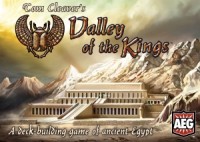
Valley of the Kings
2-4
14+
45
In Valley of the Kings, 2-4 players are Egyptian nobles at the time of the pharaohs, preparing for their death and burial in the Valley of the Kings. In the Egyptian religion, when you die you can take it with you! Egyptians therefore stocked their tombs with food, shabti (statuettes of servants who will work for them in the afterlife), canopic jars (to preserve their organs), statues of the gods, household items, and amulets.
You compete with the other players to accumulate the best artifacts for your tomb. At the end of the game, you score the artifacts stored there – the player with the most victory points wins!
User Reviews (1)
Add a Review for "Valley of the Kings"
You must be logged in to add a review.


You know those gamers, the ones that scoff at you when you bring up Dominion and say the same thing they’ve seen on the internet over and over: “It’s multiplayer solitaire – there’s no player interaction!!1!1!” I know them too…
Now we have a game to whip at their head.
HOW TO PLAY:
Comparisons to Dominion are inevitable, but they build upon principles Dominion had already put down. The goal of Valley Of The Kings (VOTK) is to have the most victory points by the end of the game. You do this by placing cards in your tomb – which you’re able to do this only once per turn unless you have a card that gives you other chances to do so. You score points by having unique sets of cards and having cards that have point value on them.
The setup for VOTK is simple. Each player gets certain starting cards and the draw pile is split with level II cards and level III cards. Once both the II and III decks are shuffled, II cards go on top of III to form the draw pile. Then you form the Pyramid, the stock cards from which people can buy from. Cards are put from the deck in a pyramid, 1 on top to 3 on the bottom. Players can only buy from the bottom row of cards. When they buy cards from the bottom row, the pyramid “crumbles” and cards slide down accordingly. So it is slightly more thematic than Dominion’s stock piles. Each player draws five cards from their deck to form their hand, and play begins.
Players on their turn can do a couple things. You can buy cards using the gold printed on cards in your hand, use one of your cards’ actions, and you may put one card into your tomb. However, unlike Dominion, you may only do one of the these things per card. For example, I would not be able to use a card for gold value and use its action – I have to choose one or the other. This gives an interesting dynamic and provides a nice give and take.
Which is what a lot of this game is about: a give and take between not just the players, but between the player and his deck. Never has a deck builder had me playing so efficiently in order to win. Most times, by the end of the game, I’m down to five cards total. Entombing cards gets extremely important; especially by the end when players are scrambling to get a few more points. The theme in this case fits the mechanics so well – because you literally can’t take it with you.
It’s also nice that there is a definite end to this game, unlike Dominion where it is set upon who can buy the most. The game ends when there are no more cards in the deck, in the pyramid, and everyone has taken the same amount of turns. Not only does the game end in this finite amount of time (40 min, give or take), but it makes it so whoever has played the best is the winner.
On the downside, this game is a bit heavier than people anticipate it to be (even I was surprised). Newer players may be put off by a learning curve, especially if you aren’t a gamer. Being an efficient deck builder means you run into situations where you might not have gotten some cards you needed and cannot buy the more expensive cards. This can lead to some frustration and sitting around at the end of the game wondering what to do.
If you are prone to analysis paralysis (taking a long time on your turn to think of the right move) this game can stress you out and drag the game out longer. I’ve seen experienced players take their time to figure out what they should. The game presents itself with so many risks/choices that it can make it difficult to move things along with thinking you’ve made a mistake.
Lastly, (and this is a small lastly) the theme in this game can turn some people off. I love this game and I think it could use a little more color than the colors denoting sets. IF you’re like me and don’t mind some of the “ancient” aesthetic the game, has than it’s no problem.
TL:DR
Pros:
– Deep Game in a small box
– Lots of Choices
– Builds upon Dominion knowledge and improves
Cons:
– Lots of Choices
– Harder, especially for newer gamers
– Theme can be somewhat dull
Recommended to:
Family: Maybe, if you’re family is looking for that next step from Dominion.
Strategy: Yes. The game lends itself to players who know how to play it.
Social: No. This is a little more serious, less party gameish.
Avid: Yes. Easy to transport to your game groups and doesn’t take up room on your shelf.
Casual: No. Little too heavy.
Power: Maybe. There won’t be tournaments of this, but there are times when you can pound people into the ground with this one.
VERDICT: 8/10 A gamers’ Dominion. At $20, you couldn’t ask for better value.